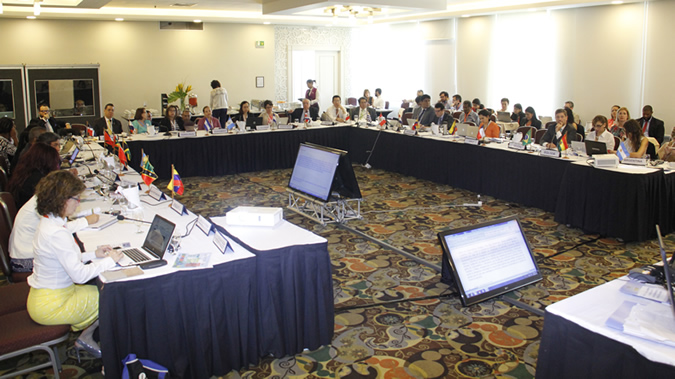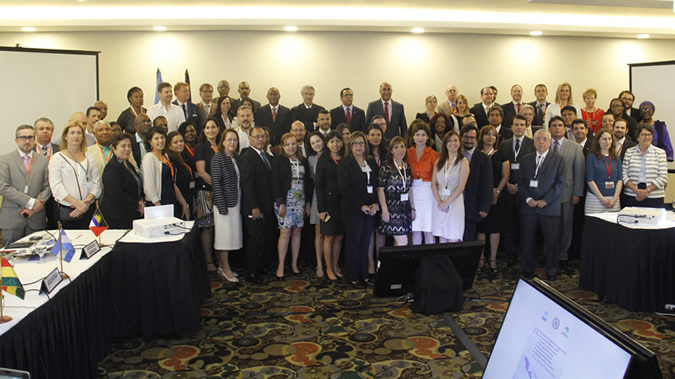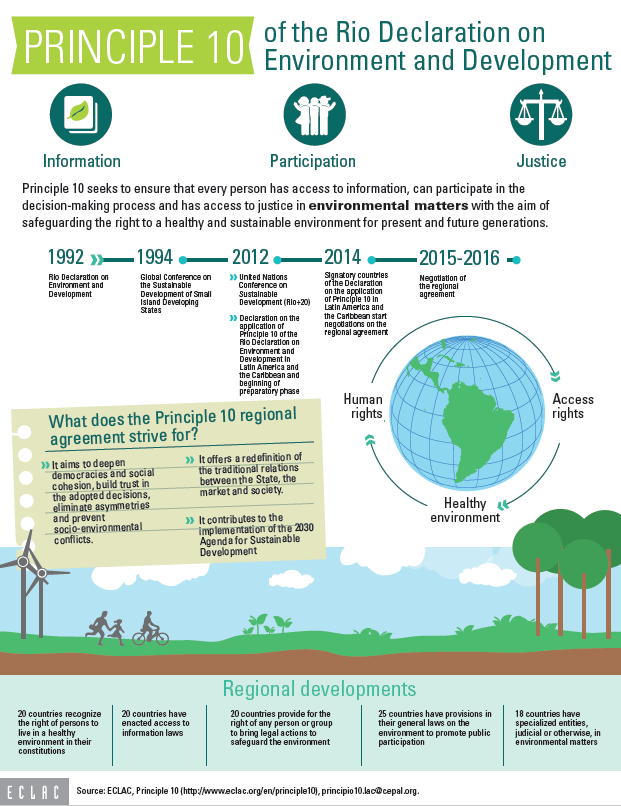Santiago, Chile, will Host New Round of Negotiations for Regional Agreement on Rights of Access in Environmental Matters
Work area(s)
In the Dominican Republic, delegates from 22 Latin American and Caribbean countries closed the Fourth meeting of the negotiating committee on Principle 10 of the Rio Declaration on Environment and Development.

From 22 to 25 November 2016, Santiago, Chile, will host the Fifth meeting of the negotiating committee on rights of access in environmental matters, where Latin American and Caribbean countries will continue to make progress towards a legal instrument protecting access to information, participation and justice in environmental matters, as enshrined in Principle 10 of the Rio Declaration on Environment and Development.
This was agreed today by the 22 countries to have signed the Declaration on the application of Principle 10 in the region at the end of the Fourth meeting of the negotiating committee for the regional agreement on access to information, public participation and access to justice in environmental matters in Latin America and the Caribbean, which was held in Santo Domingo, Dominican Republic, from 9 to 12 August.
The meeting was organized by the Economic Commission for Latin America and the Caribbean (ECLAC) and the Government of the Dominican Republic (through the Ministry for Foreign Affairs (MIREX) and the Ministry for the Environment and Natural Resources).
At the Santo Domingo meeting, the negotiating committee discussed the provisions on the right of access to environmental information and the generation and dissemination of such information. Countries agreed to ensure that, in the case of an imminent threat to health or the environment, all information that might help the public take measures to prevent or limit potential damage is disseminated immediately. They also agreed to use available mechanisms to develop and implement an early warning system.
In addition, delegates discussed the need to give special attention to vulnerable groups (so that these may access environmental information) and to ensure that the authorities disseminate such information in the various languages used in a country and in alternative formats understandable to those groups.
Participants welcomed the signing of the agreement on Application of Principle 10 by St Kitts and Nevis, and reiterated the invitation to all Latin American and Caribbean countries to join the regional process.
At the closing session, the Chair of the meeting, Ambassador Luis Omar Fernández, from the Dominican Republic’s Ministry for Foreign Affairs, congratulated delegates on the level of participation, commitment and flexibility demonstrated by the negotiators. He pointed out what was new about the process and said he was sure that progress would continue in Santiago and future rounds of negotiations.
The elected public representative, Andrea Sanhueza, commented on the friendly and constructive atmosphere at this fourth meeting. She stated that they would continue to work proactively and substantively at the regional level and in each country to achieve social peace, people’s right to live in a health environment and a good quality of life for the region’s peoples.
The Head of the ECLAC Policies for Sustainable Development Unit (Sustainable Development and Human Settlements Division), Carlos de Miguel, thanked the Dominican Republic for the extraordinary welcome and for having organized the meeting. He also reiterated ECLAC’s commitment (as technical secretariat for the process) to see the negotiations through to a successful completion.
He stated that, for ECLAC, seeing participants negotiate with this approach was an example that could help many other negotiating processes. He described the work of delegates as laying the foundations for the region to make advances in many other areas, and said he expected to see major progress in Santiago.
Related content

Latin American and Caribbean Countries Boost Progress towards a Regional Agreement on Environmental Matters
The fourth meeting of the negotiating committee on Principle 10 of the Rio Declaration on Environment and Development began today in the Dominican Republic.

More Citizenship for Sustainable Development
Op-ed by Alicia Bárcena, ECLAC’s Executive Secretary, and Carlos de Miguel, Head of the Policies for Sustainable Development Unit of the Sustainable Development and Human Settlements Division of…

Principle 10 of the Rio Declaration on Environment and Development
Principle 10 seeks to ensure that every person has access to information, can participate in the decision-making process and has access to justice in environmental matters with the aim of…
Subregional headquarter(s) and office(s)
Subregional Headquarters, MexicoRelated link(s)
Country(ies)
- Latin America and the Caribbean
- Dominican Republic
Contact
Public Information Unit
- prensa@cepal.org
- (56 2) 2210 2040